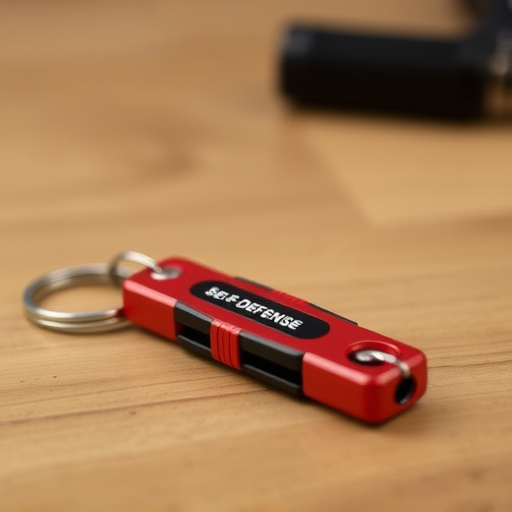Tactical keychain alarms with light are compact, portable self-defense tools that offer multi-layered protection due to their high-decibel alarm and integrated light. Legal in many US states (but varying greatly) as non-lethal weapons, they're gaining popularity for personal safety. When choosing one, balance functionality and legality, checking state regulations on noise levels and activation mechanisms; select a discreet yet powerful device with reliable features like high decibels, long battery life, and easy use, testing regularly and keeping spare batteries handy.
“In today’s world, personal safety is a top priority. One innovative solution gaining traction is the tactical keychain alarm with light—a compact self-defense tool that offers peace of mind. This article explores the legal landscape surrounding these keychains, focusing on US states where their use is permitted under specific regulations. We’ll guide you through understanding the features and legal requirements, providing insights to help you make an informed decision when choosing a self-defense keychain that meets your needs while adhering to local laws.”
- Understanding Tactical Keychain Alarms With Light: A Brief Overview
- Legal Considerations: What States Allow Self-Defense Keychains?
- Key Features and Regulations of Legal Self-Defense Keychains
- Choosing the Right Self-Defense Keychain: Tips and Best Practices
Understanding Tactical Keychain Alarms With Light: A Brief Overview
Tactical Keychain Alarms With Light are compact self-defense tools designed for personal safety. These keychains typically feature a high-decibel alarm and an integrated light, offering multi-layered protection in various situations. The alarm can attract attention and deter potential attackers, while the light aids visibility during nighttime or low-light conditions.
A key aspect of these tactical keychains is their portability. They are small enough to fit comfortably on a keychain, making them easily accessible whenever needed. This convenience allows users to carry a reliable self-defense tool without compromising mobility or daily routines. In many jurisdictions, carrying such tactical accessories is legal as long as the alarm volume meets specific decibel requirements and the light operates within permitted intensity levels.
Legal Considerations: What States Allow Self-Defense Keychains?
In the United States, the legality of self-defense keychains varies significantly from state to state. While many states allow the possession and use of tactical keychain alarms with light for personal protection, others have stricter regulations. Keychain defense devices are typically considered as non-lethal weapons, subject to state laws governing such items.
Some states explicitly permit the carrying of small personal alarms or keychains designed for self-defense, often without a license requirement. These laws usually emphasize that the device must produce a loud noise or light to deter potential attackers. Conversely, other states may classify these tactical keychains as restricted or prohibited items, especially if they have features like pepper spray or stun capabilities. It’s crucial for individuals considering carrying a self-defense keychain to familiarize themselves with their state’s specific legal framework.
Key Features and Regulations of Legal Self-Defense Keychains
Self-defense keychains, especially tactical models like the Tactical Keychain Alarm With Light, are becoming increasingly popular as personal safety devices. These compact tools offer a quick and effective way to deter potential attackers and signal for help in emergency situations. One of the key features that make them legal and effective is their ability to emit a loud alarm and often include a strobe light to disorient and startle assailants.
Regulations surrounding these devices vary by state, but many areas have specific requirements for their use and possession. For instance, some states mandate minimal decibel levels for alarms, while others may require registration or permits for certain types of self-defense tools. It’s crucial to understand local laws to ensure legal compliance. Additionally, responsible use is essential; these devices should be employed as a last resort and only when an individual feels threatened or is in danger. Always check with local law enforcement or legal professionals for the most accurate information regarding the legality of tactical keychains in your area.
Choosing the Right Self-Defense Keychain: Tips and Best Practices
When selecting a self-defense keychain, it’s crucial to consider both its functionality and legality in your state. A tactical keychain alarm with light can be an effective personal safety tool, but understanding local regulations is paramount. Check your state’s specific laws regarding self-defense devices carried on keys, focusing on restrictions related to noise levels, activation mechanisms, and public carry.
Opting for a discreet yet powerful option like a tactical keychain alarm with light could be wise. Look for features like a high-decibel alarm, long-lasting battery life, and an easy-to-use activation mechanism. Remember that best practices include familiarizing yourself with the device’s operation before relying on it in a real situation. Regularly test the alarm and keep spare batteries handy to ensure your self-defense keychain is always ready when you need it most.
When considering a self-defense keychain, such as a tactical keychain alarm with light, understanding both its functionality and legal requirements is paramount. Each state has its own set of regulations regarding these devices, so it’s crucial to research and select one that complies with local laws. By choosing a keychain with key features approved by relevant authorities, you can ensure your safety without risking legal repercussions. Remember, being prepared for self-defense is a right, but it must be exercised responsibly within the boundaries set by your state’s legislation.
